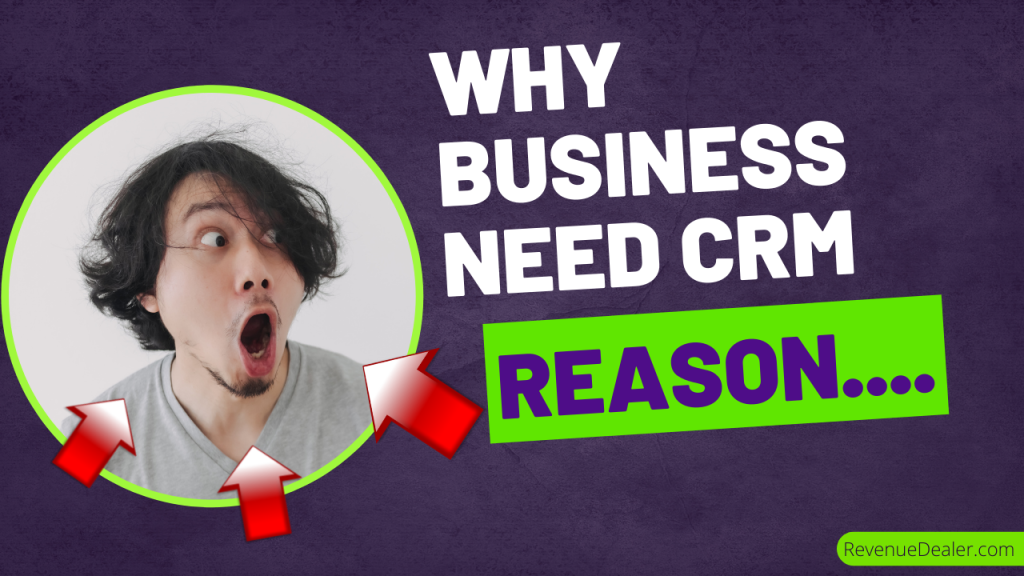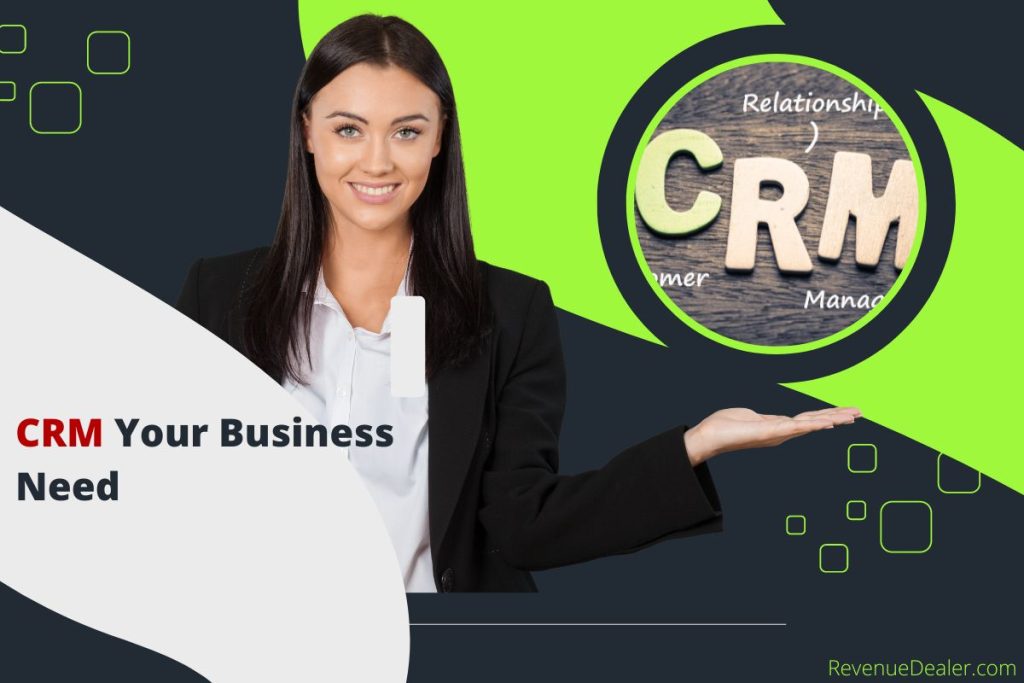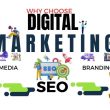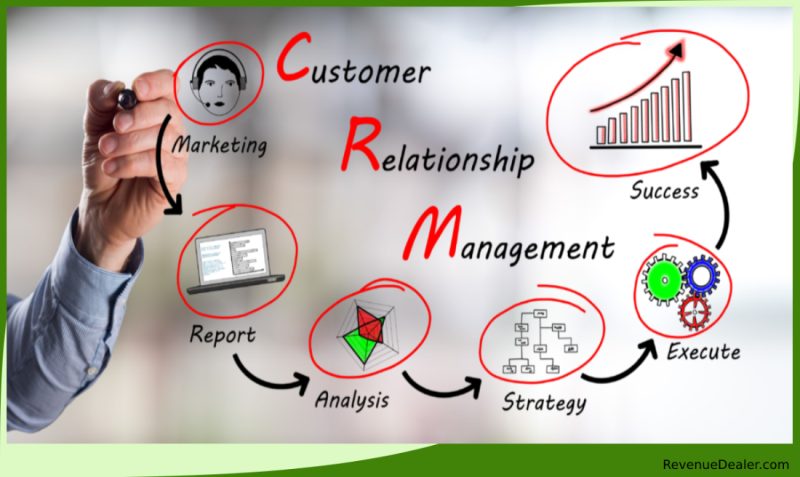You might be thinking…Why business need a CRM? The truth is every business or organization with multiple stakeholders who aims to improve productivity needs a CRM to help them foster relationships with their customers better.
Business is never accessible…at least if you’re in business, it shouldn’t be. It can be challenging and pretty stressful. And as time passes, more things come up that you need to deal with and manage. But things may get more accessible for you and your business with the help of a CRM system. A CRM allows you to be proactive and manage things like customer relationships and leads better so that you don’t have panic mode all the time.
In this article, we’ll explore what CRM is, how it works, how it can help your business grow and last but not least, how you know that now your business needs CRM.
What Is CRM?

Customer relationship management (CRM) manages how your business interacts with its customers. It’s about knowing who your customers are, what they want, and how to give it to them. It’s essential to have a robust CRM strategy because it helps you make sales without having to spend money on advertising or other marketing campaigns.
The goal of CRM is to build strong relationships with your customers. So that they will keep coming back for more; the better you know your customers, the more likely they will buy from you. You can also use CRM strategies to reach out to people who haven’t bought from you yet but might be interested in doing so in the future.
You may have heard terms like “CRM” and “data-driven marketing” thrown around in the past few years—for a good reason! They’re tools that can help businesses become more efficient, effective, and successful.
How Does CRM System Work?

You can use a CRM system to track the details of each customer interaction you have with your customers—from emails or phone calls to in-person meetings or events.
As a result, you’ll have a complete picture of each customer’s needs and preferences at any given time, which means you can deliver personalized offerings that meet their needs.
You may think, “Why do I need something like this?” Let’s say you run a restaurant with customers who come in daily for lunch. You know their names, what they like to eat when they usually arrive, and how much money they spend each time.
Now let’s pretend two more people come in every day for lunch: one who eats at precisely 12pm every day and another who arrives at 12:30 pm every day if you had no way of knowing which person was which when they came in—if all of your customers looked like—it would be tough for you to serve them quickly!
But because you have a CRM system that tracks each customer’s preferences (what they like to eat) and arrival times (when they usually come in), it makes it easy to serve them quickly.
Let us explain more; suppose you have an email marketing program. You can use a CRM system to track how many emails each customer has sent and opened.
This information can segment your contacts into groups based on their activity level so that you only contact those most likely to buy from your company.
10 Reasons Why Business Need CRM

Now when you have an idea that CRM is a powerful tool to help you manage your customers. You can use the information stored in the CRM software to understand how your business is doing, identify opportunities for improvement and take action to grow your sales.
Now we are mentioning ten reasons why every business needs CRM software:
Customer Retention
Customer retention is one of the reasons why businesses need CRM. The importance of customer retention has been discussed in various forms, but let’s look at it from another perspective.
According to a study by the Aberdeen Group, a business can count on $1.48 in new revenue for every dollar spent on retaining an existing customer. That means that if you have a customer who spends $100 per year with your company, and you’re able to retain them for just one more year, you’ll be able to generate an additional $148 over that period.
It’s not just about getting more money from existing customers—it’s also about gaining new customers due to word-of-mouth referrals from those who have already purchased from your company. When someone purchases a product or service from your business, they’re likely to tell their friends or family members about what they like about it—and this could lead them to become customers themselves!
But it’s not just about customer retention; it’s also about retaining valuable information about these customers so they can be contacted later when they’re ready to make another purchase or refer others who might benefit from your offer.
Monitor the Sales Process
If you’re a business owner, you probably know that sales are the lifeblood of your company. The more sales you make, the more money you have to grow your business and improve your bottom line.
But how do you know if you’re making enough sales? How do you know if the way your sales team is working is helping or hurting? When it comes to tracking your sales process, there are three main things to keep track of:
1. The number of leads generated by marketing activities
2. The number of people who convert from lead to customer
3. The rate at which customers buy from you again (and again and again)
If these numbers aren’t increasing over time, something likely needs fixing in your sales process. That’s where CRM comes in! A sound CRM system can help your business monitor these three critical metrics at every step so that you can identify problems before they become big enough to cause real damage.
Accuracy
CRM provides you with accurate customer data. It eliminates the need for double entry of information, saving time and reducing the possibility of incorrect customer information. With CRM, there’s no confusion over who does what and when it needs to be done; all pertinent information is available at your fingertips for easy reference. Your team can spend less time on data entry, allowing them to focus on more pressing tasks that benefit the business.
With CRM software in place, you’ll always have up-to-date customer information at your disposal. So, any changes within the company or with a client will be reflected immediately in every applicable system across all departments (sales/marketing/support).
A Single Database for the Entire Organization
In today’s business world, it’s essential to have a centralized database that everyone in the organization can access. The best way to do this is with a CRM system.
A CRM system allows you to store all your customer data in one place to see everything about your customers and their interactions with your business at a glance. This makes it easy for employees to access the information they need when they need it.
In addition, CRM systems allow you to create detailed reports and dashboards that can be used by executives, managers, sales teams and other parts of your organization. This helps everyone stay on top of what’s happening with their accounts, so they know exactly what needs attention at any given time.
Understanding your customer behaviour and eliminating unnecessary activities
Let’s understand this from an example. Let’s take a look at a bakery that specializes in cupcakes. The bakery sells person-to-person or by phone, but it also has an online store where customers can order their favourite flavors of cupcakes to be delivered.
When the owner started his business, he did not have any systems in place that would help him understand his customers’ needs, nor did he have any way of knowing how often they bought his products or what they thought about them. He only knew that they were happy when they gave him money!
When he first opened the shop and was selling from the back door of his house, there was no need for customer relationship management software because all sales were face-to-face with neighbors buying from him or people coming into town for weddings or other special occasions who wanted some baked goods for themselves and their guests.
As his business grew, so did his need for better ways of understanding who these people were so as not to lose potential clients due to poor service delivery or pricing issues!
Provide a 360 view of the customer to all employees
By leveraging CRM, your business can provide a 360 view of the customer to all employees. This means you’ll be able to see what each employee knows about the customer and how they interact with them.
You’ll also be able to see which customers interact with which other customers, so if one customer contacts another, you’ll know about it. And if one customer is having trouble with a product or service, you’ll be able to help them before their issue escalates into something more serious.
For a much better understanding, let us give you an example. Suppose you’re an online retailer and want to get more customers; you can use your CRM system to identify the top customers using your site. Then, you can send them coupons or other incentives that are tailored to what they’ve purchased before. You’ll be able to see if this strategy is successful by tracking their purchases over time.
Productivity
Imagine you’re a salesperson; your job is to make calls and follow up with potential clients. In the past, you would have spent most of your day interrupting yourself from one activity to another — making calls and sending emails until you found the right person for your business, then waiting for them to reply.
Now imagine that instead of doing all this manual work by yourself, CRM automates it! Instead of spending hours on repetitive tasks that don’t require real skill (such as sending an email), let CRM do those things while you concentrate on what makes you unique: talking with people who need your product or service.
Sales analytics
Sales analytics is a sophisticated and advanced tool to help you understand how your business moves forward. It will help you understand the trends in different segments of your business, which sectors are best performing at what time, and ways you could use to improve upon them.
The CRM of today can integrate Sales Analytics within the system. So that you can keep a close eye on these positive and negative indicators that help shape your business goals.
Increase Sales By Using Past Data As a Reference Point For Future Sales Campaigns
Having an up-to-date contact list and customer records is critical to the success of any marketing campaign. CRM makes it easy to keep track of past sales. It can help you personalize your messaging and sales pitches to each customer, allowing you to provide a better and faster resolution for them than your competitors.
CRM also helps you save time by using data from previous customer interactions rather than starting from scratch each time.
Collaboration Between Departments
Different departments in your company help develop marketing strategies and the product, which means there will be a different designer, developer and marketer for each project.
They all need to collaborate to complete their task on time. This can only happen if you have CRM software that allows them to share data and knowledge.
CRM helps you to collaborate with your teams and customers. With a reliable CRM, you can create team portals and group emails where your employees will be able to ask questions and collaborate. This way, you’ll know exactly who is doing what and when they’re doing it, so you can eliminate redundancies and meet deadlines more efficiently.
Signs That Your Business Need CRM

If you’re wondering whether your business needs customer relationship management (CRM), here are some signs that it might be time to start thinking about getting organized.
You Are Not Keeping Tabs On Your Leads
Your business needs CRM if you are not keeping tabs on your leads or do not have a single place to manage the manifold details of your leads. It is essential to record, organize and analyze all data that comes through the pipeline to optimize your sales strategy.
A good CRM will track all critical information about each lead so that all departments work together towards a common goal. CRM also improves communication and coordination between departments, so you can better coordinate with sales reps and other departments like customer support or marketing.
You Are Not Following Up With Your Customers
If you aren’t following up with your customers, there are a few reasons why this might be the case. You may not have the time to do it, or maybe you don’t feel it’s worth it. But if you’re not following up with customers, here are some of the results:
- You’re losing money. 49% of customers will buy again from a company that follows up with them to see if they need anything else or can recommend someone else who does.*
- Your customer churn rate is higher than it should be. Customers who feel forgotten by companies are more likely to leave them.*
- Customer satisfaction levels are low because no one keeps in touch with them (or only checks in occasionally). By staying engaged throughout their experience with your brand and offering feedback regularly, you’ll improve both sales conversions and retention rates over time.*
Your Business Is Stuck At The Same Level Of Growth
If your business is stuck at the same level of growth, it’s time to look into CRM. Or if you don’t have enough sales and cannot retain them, then it is a sure sign that your business needs CRM. Here is how you come to know that your business is stuck.
- You’re confused as to where your business is headed.
- You’re not growing as fast as you should be.
- You aren’t getting new customers like you want or need to.
- Your existing customers are leaving and not coming back, or they’re not buying what you want them to buy, or they’re just not engaging with your brand at the level that would make everything else easy for the business and its employees.
It’s probably time for CRM software if any of this sounds familiar.
Reports And Analytics Are a Mess
If you say, “We could be doing so much more with our leads,” or, “I wish I had a way to know what our salespeople are working on,”. Reports and analytics are a mess. They’re either inconsistent or hard to find or have been treated like data storage with no real structure or organization. You work in the cloud, but reports and analytics don’t make sense anymore. You’re often forced to use multiple pieces of software to pull together reports and analytics that should just work. Then it’s time to consider CRM.
Customers Complain About Service/Support
When Customers complain about service/support, it’s a clear sign that Your Business Needs CRM.
If you look at it from a customer’s perspective, you’re only going to be satisfied if you get what you want. If your customers complain about service or support, there’s something wrong with your business. You need to figure out what it is and fix it before it becomes a more significant issue.
I’m sure that most of us have experienced this ourselves: we call up a business for help with something, and we get to put on hold or transferred to another department where we have to explain everything over again. Or worse yet, we never even get an answer because they couldn’t help us in the first place. We don’t like being treated like that as customers, so why would we do it ourselves?
A CRM system (Customer Relationship Management) is the best way to avoid this problem. A CRM system helps businesses organize all the information they need about their customers to provide better service and support while increasing sales and improving overall customer satisfaction.
Manual Data Is Lengthy and Often Wrong
Your business is growing. You’re moving on up in the world, and you need a CRM that can keep up with your success.
Your business is growing. You want to ensure that all your customers are getting what they need from your products and services, but manual data entry is too slow and inaccurate.
Manual data entry is tedious, time-consuming, and prone to errors. Your business needs accurate customer information at all times, but manual data entry makes it difficult to get that information promptly.
Your business is growing—it’s time to start using a CRM software program!
You Struggle To Focus On The Right Customers
Focus is a big deal in business. So, if you’re struggling to focus on the right customers and engage with them, it’s probably time to consider implementing a CRM.
To succeed in business, you need to know your customers and how to reach them. But with so many different platforms and tools available, it can be hard to track what’s working and not.
That’s where a customer relationship management (CRM) solution comes in. A CRM helps you organize customer data, monitor their activity, and follow up with them based on their needs—all so you can focus on delivering a fantastic experience for everyone who walks through your door.
If this sounds like something your business could use, Revenue Dealer‘d love to help.
You Can Work Smarter Instead Of Harder With CRM

The benefits of CRM can be summed up in one word: efficiency. Your sales team will be able to work smarter instead of harder, and your business as a whole will become more streamlined as a result.
Here are some ways that you can use CRM to make your business run more smoothly:
- Track leads, follow-ups and other prospects with ease.
- Keep track of customer information like contact details and preferences.
- Automate your sales process with tools like automated tasks or email templates (think: “Welcome” emails). Salesforce even has its built-in version of Google Forms called the “Lead Capture” tab, which lets you collect information from potential customers through one simple form! You can then take this data and merge it into your database, making it available for analysis or other uses later down the line!
- Get better reports, analytics and insights into how customers behave based on their interactions with different channels such as social media sites (Facebook) and email newsletters.
Conclusion
The bottom line is that CRM helps you to identify and understand your customers better. The more information you have about them, the easier it will be for you to create a personalized experience for each of them. This improves sales, increases customer retention rates and makes an organization more efficient overall.
If you want to expand your business, you must have the right tools. The first step is identifying your needs and then finding the best CRM system for those needs. There are many different types of CRM systems, so make sure you do your research before deciding on one.






